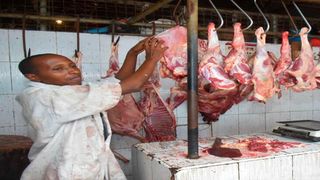
Joseph Muinde sells goat meat at Marikiti market in Mombasa County on December 23, 2019.
| File | Nation Media GroupSeeds of Gold
Premium
For quality meat trading, get training
What you need to know:
- Irene Mugo spoke to Dr Salome Kairu-Wanyoike, the principal of Meat Training Institute, on the qualities of a good meat shop, slaughtering livestock at home and why training is important.
Why is training of personnel in meat sector important?They need to know and learn about food safety and hygiene because they are important. Meat safety and hygiene is critical in ensuring consumers get quality products. It is thus vital to train meat handlers because food safety is compromised when hygiene is neglected.The Meat Control Act governs trade in meat and meat products intended for human consumption, and exercises control over slaughterhouses and places where meat is processed. A person who is in possession of a carcass or meat, in a slaughterhouse shall not part with it, unless it has been inspected.The mandate of Meat Training Institute is, therefore, to formulate and provide training programmes to promote food safety, hygiene, trade and industrial development in a sustainable environment.What are the qualities of a good meat shop and what knowledge should the attendants have?A good meat shop meets the standard requirements of the Public Health Act (Cap 242) and the Meat Control Act (Cap 356) and are duly licensed. For meat sellers, they should do a butchery attendants training course, which is designed to equip individuals with competencies for supervision of butchery operations. It entails displaying animal meat, carrying out animal meat portioning, animal meat packaging and managing records and documents.How do you ensure that the meat industry offers the best to consumers?The institute trains the manpower responsible for ensuring the safety and quality of animal origin foods meant for human consumption such as meat, milk, eggs and honey.These products should be prescribed in the Animal Diseases Control Act (Cap 364), Meat Control Act (Cap 356), Public Health Act (Cap 242), the Standards Act (Cap 496), the Food, Drugs and Chemical Substances Act (Cap 254), Prevention of Cruelty to Animals Act (Cap 360) and the Veterinary Surgeons and Veterinary Para Professionals Act (No. 29 of 2011). This contributes to a healthy population. The institute’s graduates are gazetted as inspecting officers thus playing an important role in providing environmental health through safe disposal and management of slaughterhouse waste, which should be converted into more useful products like manure but may otherwise transmit diseases to humans.Supposing I want to slaughter chicken or cattle at home when I have a ceremony (as this is what happens in most cases), what quality checks should I put in place to enhance safety?The Meat Control (Local Slaughterhouse) Regulations, 2010 prescribes as follows: a) The minister may, by a notice in the Gazette, declare any abattoir, slaughterhouse or any other place where animals are slaughtered and meat is prepared or meat products are manufactured for human consumption to be a slaughterhouse for the purpose of these regulations. b) A person shall not slaughter an animal except in a slaughterhouse. C) A person who contravenes paragraph (2) commits an offence. Thus, food animals shall be slaughtered in a designated area prescribed by the regulations[email protected]



